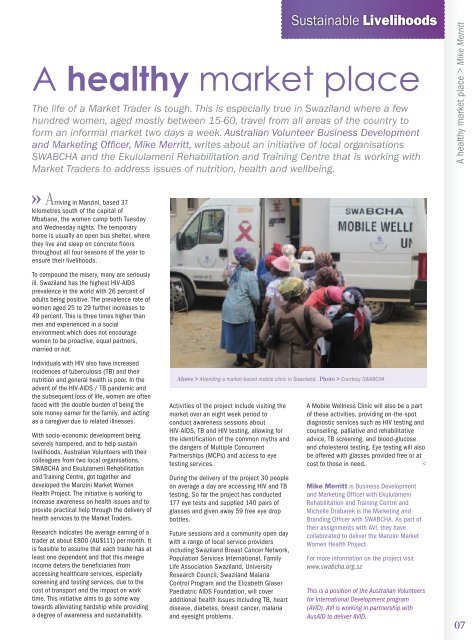Download - Australian Volunteers International
Download - Australian Volunteers International
Download - Australian Volunteers International
You also want an ePaper? Increase the reach of your titles
YUMPU automatically turns print PDFs into web optimized ePapers that Google loves.
A healthy market place<br />
The life of a Market Trader is tough. This is especially true in Swaziland where a few<br />
hundred women, aged mostly between 15-60, travel from all areas of the country to<br />
form an informal market two days a week. <strong>Australian</strong> Volunteer Business Development<br />
and Marketing Officer, Mike Merritt, writes about an initiative of local organisations<br />
SWABCHA and the Ekululameni Rehabilitation and Training Centre that is working with<br />
Market Traders to address issues of nutrition, health and wellbeing.<br />
» Arriving in Manzini, based 37<br />
kilometres south of the capital of<br />
Mbabane, the women camp both Tuesday<br />
and Wednesday nights. The temporary<br />
home is usually an open bus shelter, where<br />
they live and sleep on concrete floors<br />
throughout all four seasons of the year to<br />
ensure their livelihoods.<br />
To compound the misery, many are seriously<br />
ill. Swaziland has the highest HIV-AIDS<br />
prevalence in the world with 26 percent of<br />
adults being positive. The prevalence rate of<br />
women aged 25 to 29 further increases to<br />
49 percent. This is three times higher than<br />
men and experienced in a social<br />
environment which does not encourage<br />
women to be proactive, equal partners,<br />
married or not.<br />
Individuals with HIV also have increased<br />
incidences of tuberculosis (TB) and their<br />
nutrition and general health is poor. In the<br />
advent of the HIV-AIDS / TB pandemic and<br />
the subsequent loss of life, women are often<br />
faced with the double burden of being the<br />
sole money earner for the family, and acting<br />
as a caregiver due to related illnesses.<br />
With socio-economic development being<br />
severely hampered, and to help sustain<br />
livelihoods, <strong>Australian</strong> <strong>Volunteers</strong> with their<br />
colleagues from two local organisations,<br />
SWABCHA and Ekululameni Rehabilitation<br />
and Training Centre, got together and<br />
developed the Manzini Market Women<br />
Health Project. The initiative is working to<br />
increase awareness on health issues and to<br />
provide practical help through the delivery of<br />
health services to the Market Traders.<br />
Research indicates the average earning of a<br />
trader at about E800 (AU$111) per month. It<br />
is feasible to assume that each trader has at<br />
least one dependent and that this meagre<br />
income deters the beneficiaries from<br />
accessing healthcare services, especially<br />
screening and testing services, due to the<br />
cost of transport and the impact on work<br />
time. This initiative aims to go some way<br />
towards alleviating hardship while providing<br />
a degree of awareness and sustainability.<br />
Activities of the project include visiting the<br />
market over an eight week period to<br />
conduct awareness sessions about<br />
HIV-AIDS, TB and HIV testing, allowing for<br />
the identification of the common myths and<br />
the dangers of Multiple Concurrent<br />
Partnerships (MCPs) and access to eye<br />
testing services.<br />
During the delivery of the project 30 people<br />
on average a day are accessing HIV and TB<br />
testing. So far the project has conducted<br />
177 eye tests and supplied 140 pairs of<br />
glasses and given away 59 free eye drop<br />
bottles.<br />
Future sessions and a community open day<br />
with a range of local service providers<br />
including Swaziland Breast Cancer Network,<br />
Population Services <strong>International</strong>, Family<br />
Life Association Swaziland, University<br />
Research Council, Swaziland Malaria<br />
Control Program and the Elizabeth Glaser<br />
Paediatric AIDS Foundation, will cover<br />
additional health issues including TB, heart<br />
disease, diabetes, breast cancer, malaria<br />
and eyesight problems.<br />
Sustainable Livelihoods<br />
Above > Attending a market-based mobile clinic in Swaziland. Photo > Courtesy SWABCHA<br />
A Mobile Wellness Clinic will also be a part<br />
of these activities, providing on-the-spot<br />
diagnostic services such as HIV testing and<br />
counselling, palliative and rehabilitative<br />
advice, TB screening, and blood-glucose<br />
and cholesterol testing. Eye testing will also<br />
be offered with glasses provided free or at<br />
cost to those in need. <<br />
Mike Merritt is Business Development<br />
and Marketing Officer with Ekululameni<br />
Rehabilitation and Training Centre and<br />
Michelle Drabarek is the Marketing and<br />
Branding Officer with SWABCHA. As part of<br />
their assignments with AVI, they have<br />
collaborated to deliver the Manzini Market<br />
Women Health Project.<br />
For more information on the project visit<br />
www.swabcha.org.sz<br />
This is a position of the <strong>Australian</strong> <strong>Volunteers</strong><br />
for <strong>International</strong> Development program<br />
(AVID). AVI is working in partnership with<br />
AusAID to deliver AVID.<br />
A healthy market place > Mike Merritt<br />
07


